系动词
- 格式:docx
- 大小:23.98 KB
- 文档页数:8
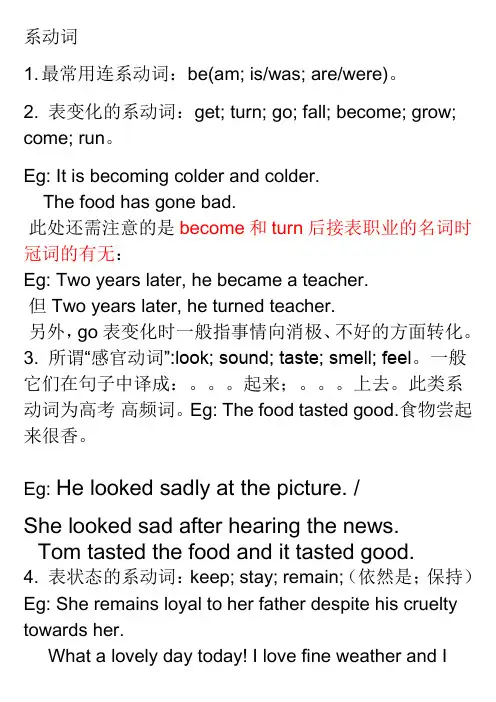
系动词1. 最常用连系动词:be(am; is/was; are/were)。
2. 表变化的系动词:get; turn; go; fall; become; grow; come; run。
Eg: It is becoming colder and colder.The food has gone bad.此处还需注意的是become和turn后接表职业的名词时冠词的有无:Eg: Two years later, he became a teacher.但Two years later, he turned teacher.另外,go表变化时一般指事情向消极、不好的方面转化。
3. 所谓“感官动词”:look; sound; taste; smell; feel。
一般它们在句子中译成:。
起来;。
上去。
此类系动词为高考高频词。
Eg: The food tasted good.食物尝起来很香。
Eg: He looked sadly at the picture. /She looked sad after hearing the news.Tom tasted the food and it tasted good.4. 表状态的系动词:keep; stay; remain;(依然是;保持)Eg: She remains loyal to her father despite his cruelty towards her.What a lovely day today! I love fine weather and Ihope it will stay fine for some more days.Much remains to be done.5. 表像系动词:seem; appear。
汉语意义:看起来像、似乎、好像。
这两个动词有一个共同的特点,即如果要表达时态的变化,需要后接不定时来完成。
Eg: He seemed to have caught cold./ When Father came in, Tom seemed to be eating something.句型转换也要要求牢记It seemed that he had caught cold.When Father came in, it seemed that Tom was eating something.6. 终止系动词:prove; turn out。
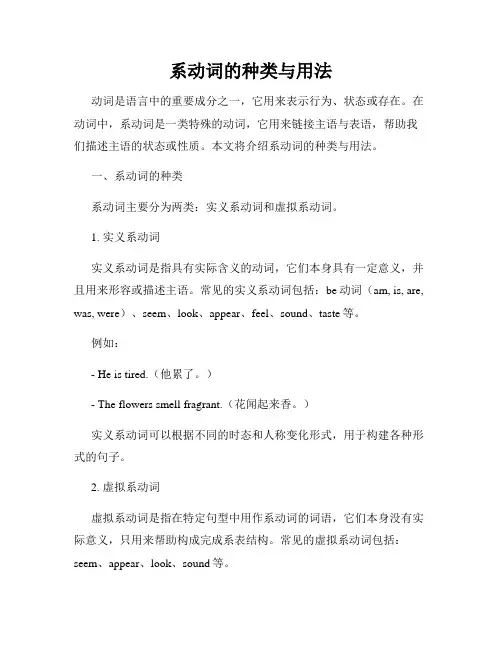
系动词的种类与用法动词是语言中的重要成分之一,它用来表示行为、状态或存在。
在动词中,系动词是一类特殊的动词,它用来链接主语与表语,帮助我们描述主语的状态或性质。
本文将介绍系动词的种类与用法。
一、系动词的种类系动词主要分为两类:实义系动词和虚拟系动词。
1. 实义系动词实义系动词是指具有实际含义的动词,它们本身具有一定意义,并且用来形容或描述主语。
常见的实义系动词包括:be动词(am, is, are, was, were)、seem、look、appear、feel、sound、taste等。
例如:- He is tired.(他累了。
)- The flowers smell fragrant.(花闻起来香。
)实义系动词可以根据不同的时态和人称变化形式,用于构建各种形式的句子。
2. 虚拟系动词虚拟系动词是指在特定句型中用作系动词的词语,它们本身没有实际意义,只用来帮助构成完成系表结构。
常见的虚拟系动词包括:seem、appear、look、sound等。
- The weather seems nice today.(今天天气似乎很好。
)- The food smells delicious.(这食物闻起来很好吃。
)二、系动词的用法系动词的用法主要表现在以下几个方面。
1. 连系主语与表语系动词用于连接主语与表语,帮助我们描述主语的状态或性质。
例如:- She is a doctor.(她是一名医生。
)- The book seems interesting.(这本书似乎很有趣。
)2. 强调句型系动词在强调句型中发挥着重要作用。
通过将系动词本身进行强调,突出强调句子中的内容。
例如:- It is you who are responsible for this.(应该是你对此负责。
)- It was the dog that bit me.(咬我的是那只狗。
)3. 系动词的时态和人称变化系动词根据不同的时态和人称变化形式,用于构建各种形式的句子。
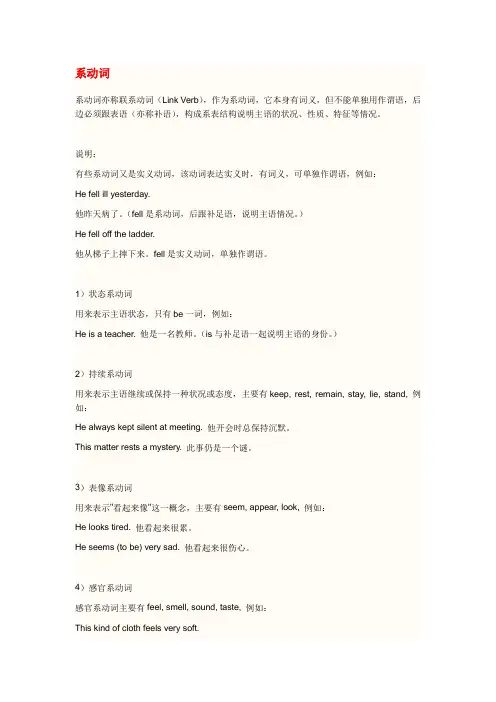
系动词系动词亦称联系动词(Link Verb),作为系动词,它本身有词义,但不能单独用作谓语,后边必须跟表语(亦称补语),构成系表结构说明主语的状况、性质、特征等情况。
说明:有些系动词又是实义动词,该动词表达实义时,有词义,可单独作谓语,例如:He fell ill yesterday.他昨天病了。
(fell是系动词,后跟补足语,说明主语情况。
)He fell off the ladder.他从梯子上摔下来。
fell是实义动词,单独作谓语。
1)状态系动词用来表示主语状态,只有be一词,例如:He is a teacher. 他是一名教师。
(is与补足语一起说明主语的身份。
)2)持续系动词用来表示主语继续或保持一种状况或态度,主要有keep, rest, remain, stay, lie, stand, 例如:He always kept silent at meeting. 他开会时总保持沉默。
This matter rests a mystery. 此事仍是一个谜。
3)表像系动词用来表示"看起来像"这一概念,主要有seem, appear, look, 例如:He looks tired. 他看起来很累。
He seems (to be) very sad. 他看起来很伤心。
4)感官系动词感官系动词主要有feel, smell, sound, taste, 例如:This kind of cloth feels very soft.这种布手感很软。
This flower smells very sweet.这朵花闻起来很香。
5)变化系动词这些系动词表示主语变成什么样,变化系动词主要有become, grow, turn, fall, get, go, come, run.例如:He became mad after that. 自那之后,他疯了。
She grew rich within a short time. 她没多长时间就富了。
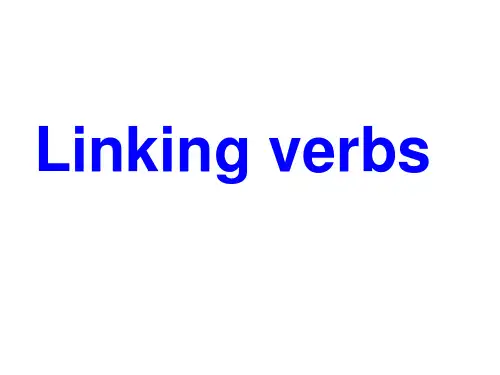
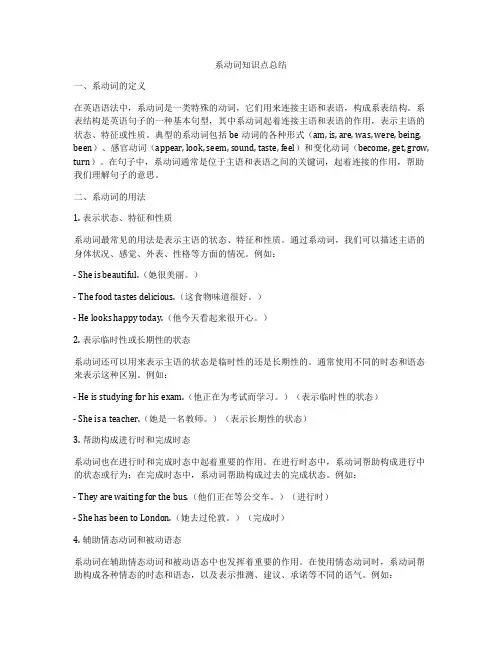
系动词知识点总结一、系动词的定义在英语语法中,系动词是一类特殊的动词,它们用来连接主语和表语,构成系表结构。
系表结构是英语句子的一种基本句型,其中系动词起着连接主语和表语的作用,表示主语的状态、特征或性质。
典型的系动词包括be动词的各种形式(am, is, are, was, were, being, been)、感官动词(appear, look, seem, sound, taste, feel)和变化动词(become, get, grow, turn)。
在句子中,系动词通常是位于主语和表语之间的关键词,起着连接的作用,帮助我们理解句子的意思。
二、系动词的用法1. 表示状态、特征和性质系动词最常见的用法是表示主语的状态、特征和性质。
通过系动词,我们可以描述主语的身体状况、感觉、外表、性格等方面的情况。
例如:- She is beautiful.(她很美丽。
)- The food tastes delicious.(这食物味道很好。
)- He looks happy today.(他今天看起来很开心。
)2. 表示临时性或长期性的状态系动词还可以用来表示主语的状态是临时性的还是长期性的。
通常使用不同的时态和语态来表示这种区别。
例如:- He is studying for his exam.(他正在为考试而学习。
)(表示临时性的状态)- She is a teacher.(她是一名教师。
)(表示长期性的状态)3. 帮助构成进行时和完成时态系动词也在进行时和完成时态中起着重要的作用。
在进行时态中,系动词帮助构成进行中的状态或行为;在完成时态中,系动词帮助构成过去的完成状态。
例如:- They are waiting for the bus.(他们正在等公交车。
)(进行时)- She has been to London.(她去过伦敦。
)(完成时)4. 辅助情态动词和被动语态系动词在辅助情态动词和被动语态中也发挥着重要的作用。
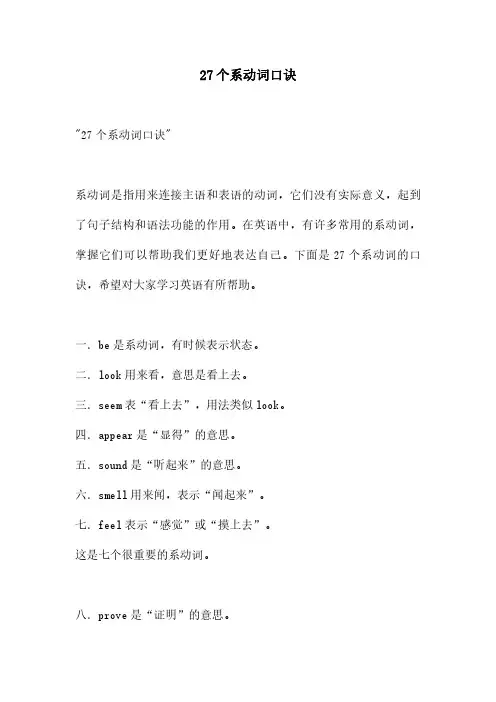
27个系动词口诀"27个系动词口诀"系动词是指用来连接主语和表语的动词,它们没有实际意义,起到了句子结构和语法功能的作用。
在英语中,有许多常用的系动词,掌握它们可以帮助我们更好地表达自己。
下面是27个系动词的口诀,希望对大家学习英语有所帮助。
一.be是系动词,有时候表示状态。
二.look用来看,意思是看上去。
三.seem表“看上去”,用法类似look。
四.appear是“显得”的意思。
五.sound是“听起来”的意思。
六.smell用来闻,表示“闻起来”。
七.feel表示“感觉”或“摸上去”。
这是七个很重要的系动词。
八.prove是“证明”的意思。
九.become是“变成”的意思。
十.get用来表示“变得”。
十一.grow表示“逐渐变得”。
十二.turn用来表示“变成”。
十三.keep是“保持”的意思。
这是六个常用的系动词。
十四.remain表示“仍然是”。
十五.stay表示“保持”或“停留”。
十六.stand表示“站立”或“忍受”。
十七.lie是“躺下”的意思。
十八.sit表示“坐下”。
十九.rest表示“休息”。
这是六个描述位置和状态的系动词。
二十.prove是“证明”的意思。
二十一.go用来表示“变得”。
二十二.come表示“变得”或“成为”。
二十三.fall表示“变成”或“落下”。
二十四.get用来表示“变得”。
二十五.turn表示“转变”或“变成”。
二十六.grow表示“逐渐变得”。
二十七.keep是“保持”的意思。
这是七个帮助我们描述变化和状态的系动词。
以上就是27个常用的系动词口诀。
掌握这些系动词的用法,可以帮助我们更准确地表达自己的意思。
希望大家能够通过口诀记住这些系动词,提升自己的英语水平。
记住,学习英语需要勤奋和坚持,只要我们持之以恒,一定能够取得进步!。
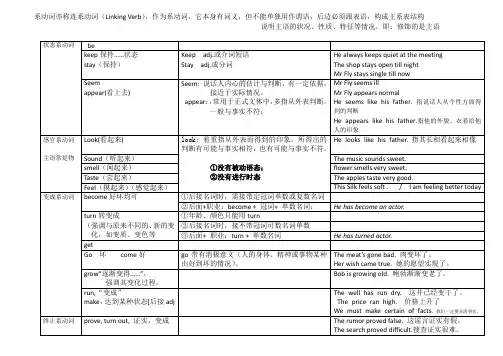
系动词亦称连系动词(Linking Verb),作为系动词,它本身有词义,但不能单独用作谓语,后边必须跟表语,构成主系表结构说明主语的状况、性质、特征等情况。
即:修饰的是主语⏹系动词与一般动词辨析He looked sad at the news.(“看起来”,系动词用法)He looks a clever boy .(“看起来”,系动词用法)He looked sadly at the boy.(“看着”,实义动词用法) He looks at a clever boy.(“看着”,实义动词用法)⏹系动词除了接名词、形容词、分词、不定式、副词和介词短语等以外,还可接以下几种表语形式:①能接as if/as though表语从句的系动词有:look(看起来),smell(闻起来),sound(听起来),feel(觉得);appear(显得),seem(似乎)等。
He looked as if he had just stepped out of my book of fairy tales.She seemed as if (though) she couldn’t understand why Laura was there.It sounds to me as though there’s a tap running somewhere.She felt as if her head were splitting.The river appeared as if enveloped in smog.②可用于“It+系动词+that从句”结构的有:seem和appear不可用be、look。
It seemed that he had made some serious mistakes in his work.It appeared that he was talking to himself.③能用不定式作表语的系动词有be、seem、get、look、appear、prove、grow等。
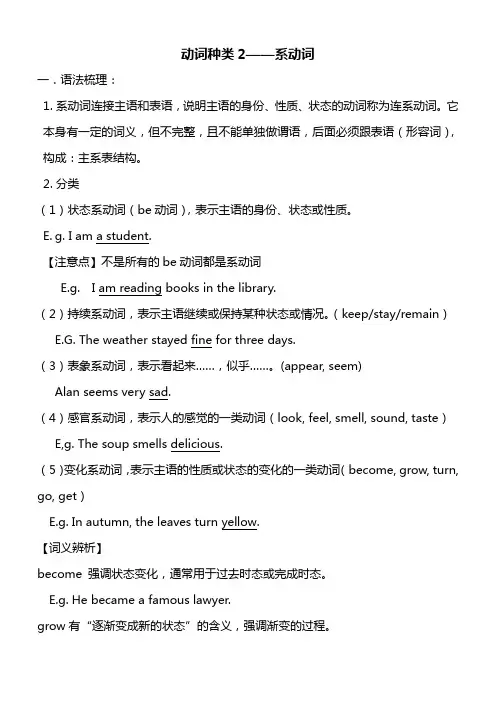
动词种类2——系动词一.语法梳理:1.系动词连接主语和表语,说明主语的身份、性质、状态的动词称为连系动词。
它本身有一定的词义,但不完整,且不能单独做谓语,后面必须跟表语(形容词),构成:主系表结构。
2.分类(1)状态系动词(be动词),表示主语的身份、状态或性质。
E.g. I am a student.【注意点】不是所有的be动词都是系动词E.g. I am reading books in the library.(2)持续系动词,表示主语继续或保持某种状态或情况。
(keep/stay/remain)E.G. The weather stayed fine for three days.(3)表象系动词,表示看起来……,似乎……。
(appear, seem)Alan seems very sad.(4)感官系动词,表示人的感觉的一类动词(look, feel, smell, sound, taste)E,g. The soup smells delicious.(5)变化系动词,表示主语的性质或状态的变化的一类动词(become, grow, turn, go, get)E.g. In autumn, the leaves turn yellow.【词义辨析】become 强调状态变化,通常用于过去时态或完成时态。
E.g. He became a famous lawyer.grow有“逐渐变成新的状态”的含义,强调渐变的过程。
E.g. My little brother is growing tall.get 常指某人或某物有意无意地获得引起变化的因素,结果变成另一种状态,如天气、身体、情绪等。
E.g. It is getting colder and colder.turn 常指改变性质、状况、颜色等,后接名词作表语时,名词前不用冠词。
E.g. He turned engineer. =He became an engineer,.go 指进入某种状态,从而发生变化,多表示向不好的方面转变。
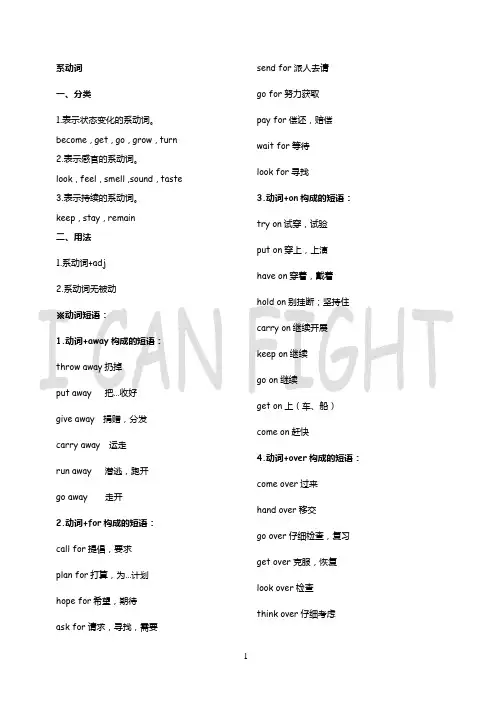
系动词一、分类1.表示状态变化的系动词。
become , get , go , grow , turn2.表示感官的系动词。
look , feel , smell ,sound , taste 3.表示持续的系动词。
keep , stay , remain二、用法1.系动词+adj2.系动词无被动※动词短语:1.动词+away构成的短语:throw away扔掉put away 把…收好give away 捐赠,分发carry away 运走run away 潜逃,跑开go away 走开2.动词+for构成的短语:call for提倡,要求plan for打算,为…计划hope for希望,期待ask for请求,寻找,需要send for派人去请go for努力获取pay for偿还,赔偿wait for等待look for寻找3.动词+on构成的短语:try on试穿,试验put on穿上,上演have on穿着,戴着hold on别挂断;坚持住carry on继续开展keep on继续go on继续get on上(车、船)come on赶快4.动词+over构成的短语:come over过来hand over移交go over仔细检查,复习get over克服,恢复look over检查think over仔细考虑take over接受,接管turn over翻转5.动词+up构成的短语:bring up抚育,培养call up召唤,打电话给come up走进,上来cut up切碎fix up修理give up放弃go up上升,增长grow up长大look up尊敬,向上看,查寻make up虚构,弥补,组成put up举起,搭建;张贴pick up捡起,(开车)接某人,偶然得到set up建立,创纪录send up发射show up揭露,露面turn up出现,把…调高一点take up占据;开始从事6.动词+out构成的短语:work out算出look out当心,小心turn out结果证明是put out扑灭,熄灭,伸出come out出来,开花,出版,发行break out战争、火灾、洪水爆发set out着手,出发,起程keep out把---挡在外面go out出去,熄灭wear out穿破run out用完give out放出、发出(光、热等);耗尽、用完;筋疲力尽7.break +介词/副词的短语:break down出故障,身体垮掉break out爆发break through突破,突围break off中断,突然停止break up打碎,分解,驱散break in打断,闯入break into破门而入break away突然离开,逃脱,脱离8.bring +介词/副词的短语:bring about使发生bring back拿回来,使恢复bring down打倒,降低,推翻bring in引进bring out出版,生产bring up培养,养育9.call +介词/副词的短语:call after以---命名call back召回call up征召入伍,给某人打电话,使想起call on号召,拜访某人call in召集call off取消e +介词/副词的短语:come in进来come from来自于come about产生come over过来come out出来,出现,出版come by从旁经过come up上来,走进come across偶遇come after跟着---来come back回来come around恢复知觉,回来come down下来,倒塌11.cut +介词/副词的短语:cut in插嘴,插入cut across抄近路cut off切断cut up切碎cut down砍倒,削减cut out切掉,裁剪出12.get +介词/副词的短语:get through通过,度过,打通(电话)get in进入,陷入get on上车,进展,融洽相处get off下车,下来get across通过,被理解get along进展,融洽相处get away离开,脱身13.give +介词/副词的短语:give up放弃give in屈服,投降give away赠送,捐赠,泄漏give over移交,交出give off放出(气味),发出give out分发,放出(光、热) give back归还14.go +介词/副词的短语:go ahead着手,开始(做),进行go along进展,前进go around到处走动,顺便访问go away离去,走开go beyond超过go by过去,流逝go down下降go up上升go for喜欢go off离开,停止go over复习,温习go through经历,穿过15.look +介词/副词的短语:look after照顾,照料look up查阅look around环顾look at看look down朝下看look for寻找look into调查look out当心look through浏览,检查16.take +介词/副词的短语:take away拿走take down写下,记下take in欺骗;吸收,吸纳take off起飞;脱下take on 承担;呈现;开始雇佣take over 接收,接管take pictures照相take care of照顾,照料take up 占据;开始从事take it easy别紧张take me for example以我为例17.turn +介词/副词的短语:turn about/ round(使)向后转,转身turn against(使)反对(某人)turn away转过脸去,拒绝turn back往回走turn up调高,出现turn down调低,拒绝turn in上缴,上交turn into(使)变成turn off关掉turn on打开turn out生产,结果是turn to求助于,转向18.put +介词/副词的短语:put aside把---放在一边,积蓄put back把---放回原处put down放下,镇压put forward提出,建议put in放进put off推迟,拖延put on穿上,戴上,增加,上演put out扑灭;熄灭put up举起,张贴19.be/get/become +P.P./adj.+介词的短语:be dressed in穿着be fond of爱好,喜爱be lost in沉溺于be located in位于be used to 习惯于be curious about对---好奇be glad to乐意---be worried about=worry about担心be covered with 被…覆盖be/get ready for (doing ) sth.= be ready to do sth为…作好准备be surprised (at)对…感到惊讶be surprised to do sth. 对干某事感到很惊讶be interested in (doing) sth.对…有兴趣be born in/ on 出生于be on …在进行;在上演;(灯)亮着be able to do sth.= can do能够做…be afraid of (doing) sth /to do sth./ that从句害怕…/不敢做…/恐怕…)be angry with /about sb. 生某人的气be angry at/about sth. 生某事的气be a symbol of sth是…的象征be famous/known for sth. 以某物而著名be full of =be filled with sth.填/充/装be famous/known as+职业作为…而著名be famous/known to sb. 为某人所熟知be strict with sb对某人严格要求be strict in sth. 对某事严格要求be/come from来自…be hungry/thirsty/tired饿了/渴了/累了be (well) worth doing(非常)值得做…be covered with被…所覆盖…be in (great) need of (很)需要…be short of sth. 短缺…be in trouble/danger处于困境/危险中be late for … 迟到be made of sth.由…制成(能看出原材料)be made from sth.由…制成(看不出原材料)be made in +sp在某地制成be made by sb.被/由某人制成be made up of sth.由…组成be made into sth.某物被制成…be satisfied/pleased with对…感到满意be free 空闲的,有空be ill in bed卧病在床be busy doing/with sth忙于(做)某事。
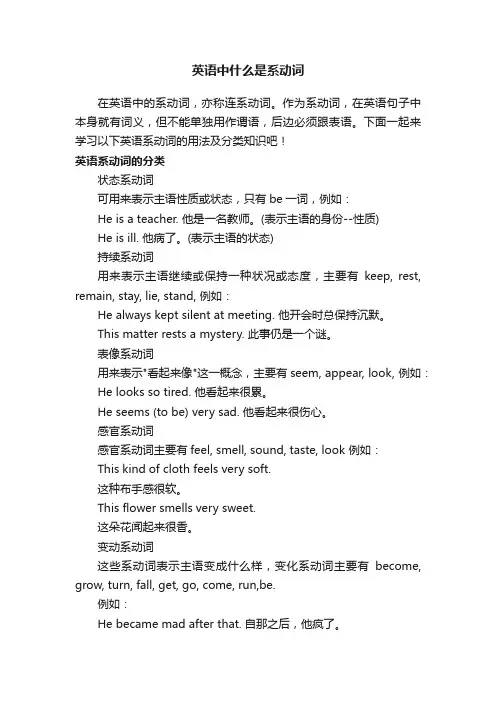
英语中什么是系动词在英语中的系动词,亦称连系动词。
作为系动词,在英语句子中本身就有词义,但不能单独用作谓语,后边必须跟表语。
下面一起来学习以下英语系动词的用法及分类知识吧!英语系动词的分类状态系动词可用来表示主语性质或状态,只有be一词,例如:He is a teacher. 他是一名教师。
(表示主语的身份--性质)He is ill. 他病了。
(表示主语的状态)持续系动词用来表示主语继续或保持一种状况或态度,主要有keep, rest, remain, stay, lie, stand, 例如:He always kept silent at meeting. 他开会时总保持沉默。
This matter rests a mystery. 此事仍是一个谜。
表像系动词用来表示"看起来像"这一概念,主要有seem, appear, look, 例如:He looks so tired. 他看起来很累。
He seems (to be) very sad. 他看起来很伤心。
感官系动词感官系动词主要有feel, smell, sound, taste, look 例如:This kind of cloth feels very soft.这种布手感很软。
This flower smells very sweet.这朵花闻起来很香。
变动系动词这些系动词表示主语变成什么样,变化系动词主要有become, grow, turn, fall, get, go, come, run,be.例如:He became mad after that. 自那之后,他疯了。
She grew rich within a short time. 她没多长时间就富了。
终止系动词表示主语已终止动作,主要有prove, turn out, 表达"证实","变成"之意,例如:The rumor proved false. 这谣言证实有假。
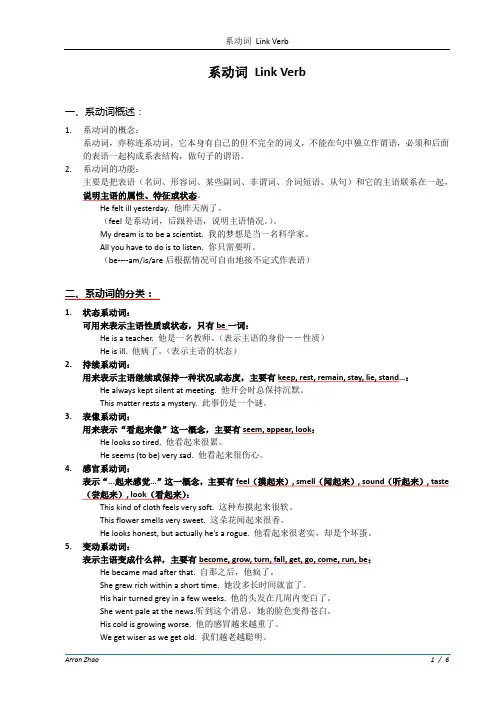
系动词Link Verb一、系动词概述:1.系动词的概念:系动词,亦称连系动词,它本身有自己的但不完全的词义,不能在句中独立作谓语,必须和后面的表语一起构成系表结构,做句子的谓语。
2.系动词的功能:主要是把表语(名词、形容词、某些副词、非谓词、介词短语、从句)和它的主语联系在一起,说明主语的属性、特征或状态。
He felt ill yesterday. 他昨天病了。
(feel是系动词,后跟补语,说明主语情况。
)。
My dream is to be a scientist. 我的梦想是当一名科学家。
All you have to do is to listen. 你只需要听。
(be----am/is/are后根据情况可自由地接不定式作表语)二、系动词的分类:1.状态系动词:可用来表示主语性质或状态,只有be一词:He is a teacher. 他是一名教师。
(表示主语的身份--性质)He is ill. 他病了。
(表示主语的状态)2.持续系动词:用来表示主语继续或保持一种状况或态度,主要有keep, rest, remain, stay, lie, stand…:He always kept silent at meeting. 他开会时总保持沉默。
This matter rests a mystery. 此事仍是一个谜。
3.表像系动词:用来表示“看起来像”这一概念,主要有seem, appear, look:He looks so tired. 他看起来很累。
He seems (to be) very sad. 他看起来很伤心。
4.感官系动词:表示“...起来感觉…”这一概念,主要有feel(摸起来), smell(闻起来), sound(听起来), taste (尝起来), look(看起来):This kind of cloth feels very soft. 这种布摸起来很软。
This flower smells very sweet. 这朵花闻起来很香。
系动词亦称联系动词(Link Verb),作为系动词,它本身有词义,但不能单独用作谓语,后边必须跟表语(亦称补语),构成系表结构说明主语的状况、性质、特征等情况。
系动词是一定没有被动语态而且大多数系动词也没有进行时态,但表示状态变化类的系动词如become, grow, turn, fall, get, go, come, run等可以用于进行时态It is getting colder and colder. 由于英语的系动词均“不及物”,所以它们不能用于被动语态。
但是,值得注意的是,英语中表示感官的系动词,如feel(摸起来,感觉),smell(闻起来),sound(听起来),taste(尝起来,吃起来) 等,由于它们按汉语意思理解好像含有被动意义,很容易弄错。
如:玻璃摸起来是光滑的。
误:Glass is felt smooth.正:Glass feels smooth.析:汉语说“摸起来”,其实就是指“被摸起来”,似乎含有被动意义,很容易错用被动语态。
这牛奶闻起来有酸味了。
误:The milk is smelt sour.正:The milk smells sour.析:汉语说“闻起来”,其实就是指“被闻起来”,似乎含有被动意义,很容易错用被动语态。
说明:有些系动词又是实义动词,该动词表达实义时,有词义,可单独作谓语,例如:He fell ill yesterday.他昨天病了。
(fell是系动词,后跟补足语,说明主语情况。
)He fell off the ladder.他从梯子上摔下来。
fell是实义动词,单独作谓语。
1)状态系动词用来表示主语状态,只有be一词,例如:He is a teacher. 他是一名教师。
(is与补足语一起说明主语的身份。
)2)持续系动词用来表示主语继续或保持一种状况或态度,主要有keep, rest, remain, stay, lie, stand, 例如:He always kept silent at meeting. 他开会时总保持沉默。
系动词(Linking Verb连系动词)系动词,也称连系动词(Linking verb),是用来辅助主语的动词。
它本身有词义,但不能单独用作谓语,其后必须跟表语,构成系表结构,说明主语的状态、性质、特征等情况。
一、主要系动词及分类二、系动词的句子结构1.系动词(Linking Verb) + 形容词(adj.)例:He looks very happy. 他看起来很高兴。
2.系动词(Linking Verb) + 名词(noun)例:They seem a happy family. 他们看起来是个幸福的家庭。
系动词测试题一、选择题1.The cloth that smooth and soft .A. feels; sells wellB. feels; is well soldC. is felt; sells wellD. is felt; sells good2.Happy birthday, Alice! So you have twenty already.A. becomeB. turnedC. grownD. passed 3.Your suggestion bad.A. hearsB. soundsC. listens toD. listens 4.Later he a doctor.A. becameB. turnedC. grownD. passed5.It's cold.A. becomingB. turningC. goingD. coming 6.The running water makes the stones very smooth.A. soundB. tasteC. smellD. feel 7.— There are dark clouds, and the wind is blowing strongly.— It that a typhoon is coming.A. feelsB. soundsC. seemsD. looks 8.— Three-D printing technology could be used to build a house in less than 24 hours.— It amazing. It’s my first time to get to know the news.A. looksB. smellsC. soundsD. tastes 9.— What will a science museum be like if you are asked to build one?— I hope it will like a book.A. tasteB. soundC. lookD. smell 10.— The medicine awful. I can’t stand it.— I see, Jimmy. But it’s helpful for you.A. tastesB. eatsC. drinksD. takes 11.Mom is cooking dinner. It so nice.A. smellsB. tastesC. feelsD. sounds12.— Do you know the song Gangnam Style?— Of course. It interesting.A. tastesB. smellsC. soundsD. feels 13.Some of my friends eat with their eyes. They prefer to order what nice.A. feelsB. smellsC. looksD. tastes14.I like soft and gentle music. It nice.A. tastesB. looksC. soundsD. feels 15.The meat smells . Throw it away.A. wellB. goodC. badlyD. bad 16.The cookies good. Could I have some more?A. tasteB. smellC. feelD. sound 17.This piece of music beautiful.A. looksB. soundsC. tastesD. smells 18.This kind of paper soft.A. feelsB. tastesC. smellsD. sounds 19.This sentence right. Please write it down.A. feelsB. soundsC. tastesD. smells 20.— I sleepy today.— Drink some tea, and you’ll be good as new.A. feelB. keepC. turnD. grow 21.— How nice the music sounds!— It does! The peaceful music will make you feel .A. excitedB. boredC. movedD. relaxed 22.— Dinner is ready. Help yourself!— Wow! It delicious. Could you please tell me how to cook it?A. tastesB. looksC. soundsD. feels二、根据汉语意思,在空白处填写适当的系动词。
系动词及用法在英语学习中,系动词是一个非常重要的语法点。
系动词,又叫连系动词,它本身有词义,但不能单独用作谓语,后边必须跟表语,构成系表结构说明主语的状况、性质、特征等情况。
常见的系动词可以分为以下几类:一、表示状态的系动词1、 be 动词“be”是最常见也是最基本的系动词,包括“am”“is”“are”以及它们的过去式“was”“were”。
例如,“I am a student”(我是一名学生。
)“He is tall”(他很高。
)“They were happy yesterday”(他们昨天很开心。
)2、 seem“seem”表示“似乎;好像”,其后常接形容词。
例如,“He seems angry”(他似乎生气了。
)“The weather seems fine”(天气似乎很好。
)3、 appear“appear”有“显得;看来;似乎”的意思,与“seem”用法相似。
如,“She appears very tired”(她看起来非常疲倦。
)4、 keep“keep”意为“保持”,强调状态的持续性。
比如,“Keep quiet, please”(请保持安静。
)“You should keep healthy”(你应该保持健康。
)5、 remain“remain”意思是“仍然是;保持不变”。
“The room remains cool all summer”(这个房间整个夏天都保持凉爽。
)6、 stay“stay”有“保持;停留”之意。
“Stay calm”(保持冷静。
)“He stayed single all his life”(他一生都保持单身。
)二、表示感官的系动词1、 look“look”表示“看起来”,常接形容词。
“You look beautiful today”(你今天看起来很漂亮。
)2、 sound“sound”意为“听起来”,其后常接形容词或 like 加名词。
“The music sounds wonderful”(这音乐听起来很棒。
系动词讲解1. 系动词定义系动词,也称为连系动词,是用于连接主语和表语的动词。
它们不表示动作或状态的变化,而是描述主语的特征或状态。
常见的系动词有“be”(如is、am、are、was、were)、“seem”、“appear”、“look”、“feel”、“taste”、“smell”等。
2. 系动词种类状态系动词:描述主语的状态,如“be”。
感官系动词:描述主语通过感官感知到的状态,如“feel”、“smell”、“taste”、“look”、“sound”。
变化系动词:描述主语的状态或特征的变化,如“become”、“get”、“turn”、“grow”、“go”。
持续系动词:描述主语持续的状态或保持的特征,如“stay”、“remain”。
3. 系动词功能系动词的主要功能是连接主语和表语,说明主语的状态、性质、特征或身份。
它们不表示动作,而是连接主语和表语之间的关系。
4. 系动词与表语系动词后通常接表语,表语可以是名词、形容词、副词、介词短语、不定式、动名词等。
表语用来描述或解释主语的状态或特征。
5. 系动词与语态系动词与语态的关系不像动作动词那样直接。
一般来说,系动词没有被动语态。
因为系动词描述的是主语的状态或特征,而不是动作,所以通常不需要使用被动语态。
6. 系动词时态系动词的时态与常见的动词时态相同,包括一般现在时、一般过去时、一般将来时、现在进行时、过去进行时、现在完成时、过去完成时等。
根据具体语境和需要选择合适的时态。
7. 系动词常见错误误用系动词:将动作动词误用作系动词,或将系动词误用作动作动词。
表语与宾语混淆:将表语误认为是宾语,或反之。
时态不一致:系动词与其后的表语时态不一致。
8. 系动词使用技巧明确主语与表语关系:在使用系动词时,首先要明确主语与表语之间的关系,选择合适的系动词来描述这种关系。
注意时态和语态:根据具体语境选择合适的时态和语态,确保句子表达准确。
避免冗余和重复:在使用系动词时,避免冗余和重复,尽量使句子简洁明了。
常用系动词及用法系动词,是英语语法中的一个重要概念。
它在句子中起着连接主语和表语的作用,用来表明主语的状态、性质、特征等。
掌握常用系动词及其用法,对于我们正确理解和运用英语句子至关重要。
接下来,让我们一起详细了解一下常用的系动词以及它们的具体用法。
首先,最常见的系动词之一是“be”动词,包括“am”“is”“are”以及它们的过去式“was”“were”。
“be”动词的用法非常广泛。
当主语是第一人称“I”时,通常使用“am”。
例如:“I am a student”(我是一名学生。
)当主语是第三人称单数时,使用“is”。
比如:“He is a doctor”(他是一名医生。
)“The book is interesting”(这本书很有趣。
)当主语是复数或者第二人称“you”时,用“are”。
像:“They are friends”(他们是朋友。
)“You are beautiful”(你很漂亮。
)“was”和“were”则用于一般过去时。
“She was happy yesterday”(她昨天很开心。
)“We were at home last night”(我们昨晚在家。
)除了“be”动词,“seem”也是常用的系动词,表示“似乎;好像”。
例如:“He seems tired”(他似乎很累。
)“It seems a good idea”(这似乎是个好主意。
)“look”作为系动词时,意思是“看起来”。
“You look pale Are you ill?”(你脸色看起来很苍白。
你生病了吗?)“The dress looks nice on you”(这条裙子你穿起来很好看。
)“feel”意为“感觉;摸起来”,也是系动词。
“I feel cold”(我感觉冷。
)“The silk feels soft”(这丝绸摸起来很柔软。
)“sound”表示“听起来”。
“The music sounds wonderful”(这音乐听起来很棒。
系动词一.系动词定义:系动词亦称联系动词(Link Verb),作为系动词,它本身有词义,但不能单独用作谓语,后边必须跟表语(亦称补语),构成系表结构说明主语的状况、性质、特征等情况。
二.最常见系动词口诀:一"be":is am are四"变":get become turn go五"感官":feel taste smell sound look三.具体分类:1.表感官的系动词:look, sound, taste, smell, feel(这些词用形容词作表语)2.表似乎的系动词seem, appear3.表变化的系动词:become, get, turn, grow, make, come, go, fall, run4.表依旧的系动词:remain, keep, stay, continue, stand, rest, lie, hold5.可带名词作表语的系动词:become, make, look, sound, fall, prove, remain, turn(该词后接的单数名词前多不用冠词。
如:He turned teacher.)6.如果同学们对于这个语法现象还是不怎么理解的话,可以以这个名句为例子学学:the man who dies rich dies disgraced.在巨富中死去,是一种耻辱。
其中的rich and disgraced是说明主语的性质的。
1)状态系动词用来表示主语状态,只有be一词,例如:He is a teacher.他是一名教师。
(is与补足语一起说明主语的身份。
)2)持续系动词用来表示主语继续或保持一种状况或态度,主要有keep, rest, remain, stay, lie, stand,例如:He always kept silent at meeting.他开会时总保持沉默。
This matter rests a mystery.此事仍是一个谜。
3)表像系动词用来表示"看起来像"这一概念,主要有seem, appear, look,例如:He looks tired.他看起来很累。
He seems (to be) very sad.他看起来很伤心。
4)感官系动词感官系动词主要有feel, smell, sound, taste,例如:This kind of cloth feels very soft.这种布手感很软。
This flower smells very sweet.这朵花闻起来很香。
5)变化系动词这些系动词表示主语变成什么样,变化系动词主要有become, grow, turn, fall, get, go, come, run.例如:He became mad after that.自那之后,他疯了。
She grew rich within a short time.她没多长时间就富了。
6)终止系动词表示主语已终止动作,主要有prove, turn out,表达"证实","变成"之意,例如:The rumor proved false.这谣言证实有假。
The search proved difficult.搜查证实很难。
His plan turned out a success.他的计划终于成功了。
(turn out表终止性结果)注意:可带名词作表语的系动词be, become, make, look, sound, fall, prove, remain, turn后接的单数名词前多不用冠词。
7)系动词无被动语态:appear,be,become,fall,feel,get,grow,keep,look,remain,seem,smell,sound,stay,taste,turn如:It sounds good.四.系动词的使用特点:1.所有的系动词都可接形容词作表语,此处略举数例。
Our future will be beautiful.She looks unhappy today.Do you feel cold?You seem/appear ill.The food tastes delicious.The weather is turning/ growing/ becoming/ getting cold.He often went hungry.2.能用名词作表语的系动词有:be, become, turn sound, remain, seem 等。
He was a postman six years ago.He has become a famous doctor.He turned traiter to his country.That sounds a good idea.He remains an ordinary worker.He seems a stranger to me。
3.能用不定式作表语的系动词有:appear, seem, get, prove, remain, turn out等。
She appears/ seems to be very young.He appears/ seems to have caught cold.They got to be friends.The meeting turned out to be successful.The theory proved to be right.Much remains to be done。
4.能接从句的有:be, seem, appear, sound, look等。
That”s why he fell ill.My idea is that we should help him.It seems/ appears to me that something is wrong.It sounds to me as if someone were trying to get into the house.Your voice sounds as if you had a cold.It looks as if it is going to rain.5.能接介词短语的有:be, feel, look, sound, taste, remain等。
be 是特别活跃的系动词,其后可接很多介词短语作表语。
He is at home/ in the library/ on the way home/ on holiday.The police are after him.He is at work on a new invention.He found the girl was in tears.They are on duty/ on strike/ on leave.The road is under repair.6.能接分词的系动词有:be, become, get, grow, seem, appear等。
His report was surpring/ disappointing/ delighting/ moving/ astonishing…The boy was moved/ delighted/ surprised/ disappointed/ astonished. He has become/ got/ grown/ interested in modern physics.He seems/ appears drunk.练习题1. My brother ____ a teacher. He ____ his pupils very much.A. is, likeB. is, likesC. are, likesD. are, like2. A: How many days ____ there in a week?B: There ____ seven.A. is, isB. are, areC. is, areD. are, is3. I ____ tired last night.A. becameB. feltC. lookedD. am4. Her face ____ pale(苍白)when she heard the bad news.A. gotB. isC. turnedD. was5. You ____ pale. What's wrong with you?A. turnB. seemC. lookD. become6. The boy ____ ill today.A. areB. isC. beD. am7. Which ____ bigger, the sun or the moon?A. areB. isC. beD. ×8. Neither she nor I ____ a doctor.A. am notB. amC. areD. is9. I ____ a worker next year.A. amB. will beC. beD. will10. Her voice ____ like my mother's.A. soundsB. soundC. looksD. look11. It often rains and the crops ____ fast.A. getB. turnC. growD. become12. A: How are you ____ now?B: Much better, thank you.A. gettingB. feelingC. makingD. turning13. The teacher's smile made me ____ better.A. feelB. to feelC. feelingD. felt14. My English teacher ____.A. all look youngB. looks youngC. look youngD. all looks young15. I ____ busy now, but I ____ free next week.A. am, amB. am, willC. am, will beD. being, will be16. I ____ at this school for about two months.A. amB. will beC. have beenD. was17. My brother ____ in the League for about five years.A. have beenB. has beenC. wasD. is18. Come to my office if you ____ free tomorrow.A. areB. will beC. wasD. is19. If water ____ heated, it will be ____ into vapour (蒸气).A. was, turnedB. is, turnedC. is. getD. was, got20. If you don't take back what you just said, Mother ____ angry.A. isB. will beC. getD. feels21. Neither of us ____ a doctor.A. amB. areC. isD. were22. He ____ a famous writer.A. turnsB. becomeC. has becomeD. has turned23. The girl's face ____ red.A. turnedB. gotC. feelD. look24. He ____ very glad.A. lookedB. turnedC. feelD. looks25. The flowers ____ fragrant (芳香).A. getB. smellsC. smellD. feels26. The table ____ very smooth.A. lookB. turnC. feelsD. smell27. Jack ____ younger than Tom.A. lookB. feelC. feelsD. looks28. She looks ____.A. happyB. to be happyC. happilyD. that she is happy(二)用smell,taste,go,get,become,grow,seem,look,feel,turn 的适当形式填空:1. You _ _ __ very young.2. At first those questions_ _ __easy, but later I found them difficult.3. After the sports meeting, he _ _ __very tired.4. My younger brother _ _ __a student last year.5. When we_ _ __ up, we're going to help build up our country.6. The flowers _ _ __very sweet.7. Her face _ _ __red.8. Jack _ _ __very happy.9. The mooncake _ _ __good.10. The meat_ _ __bad.(三)把下列各句译成英语:(20分,20分钟)1. 以她的年龄而言,她看起来很年轻。